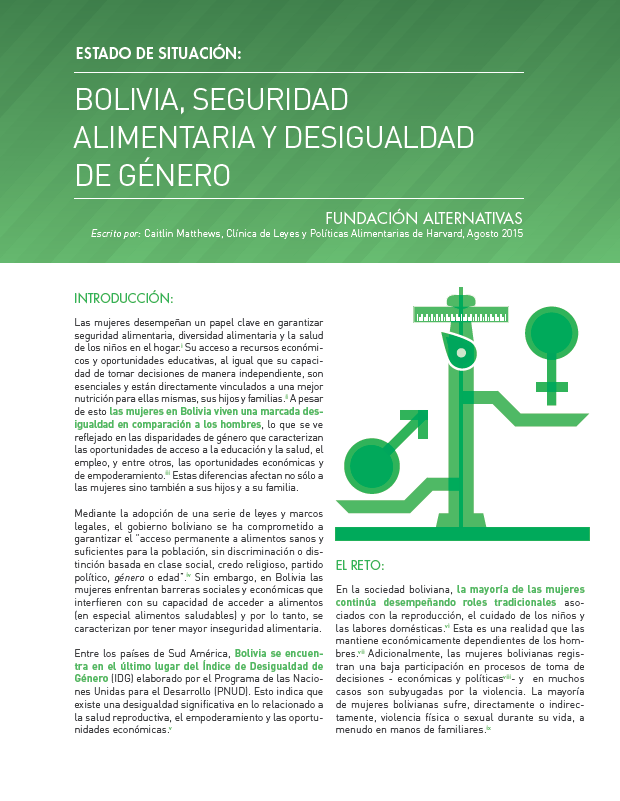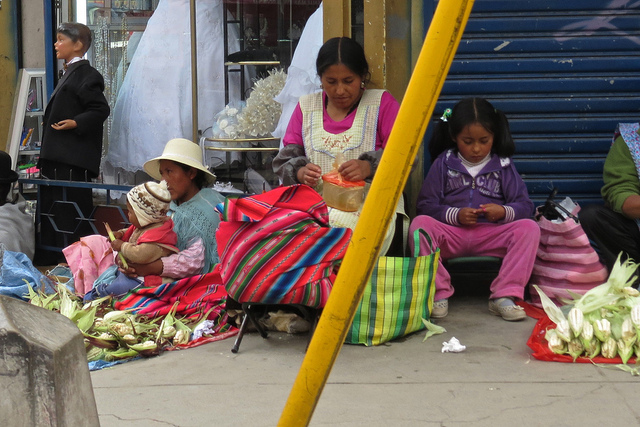Written by Caitlin Matthews (2016 FLPC Summer Intern, Tufts University M.S../M.A. ’17)
This past summer, as an intern at the Food Law and Policy Clinic (FLPC), I began working on an FLPC project with our client María Teresa Nogales, Executive Director of Fundación Alternativas, a nonprofit organization based in La Paz, Bolivia. Working through email and weekly Skype conversations, we outlined a plan for the Clinic to develop policy briefs linking food insecurity with the issues of food imports, gender inequality, and urban poverty in Bolivia. María Teresa envisioned that the briefs would answer three questions:
- What is the connection between the issue and food insecurity?
- What is the socioeconomic impact?
- What policies exist in other places to address the issue?
The project was a dream match for my skills and interests. I was engrossed in the research, much of which was in Spanish and included reading the Bolivian Constitution and national agricultural policies, digging for data from the Food and Agriculture Organization’s Statistics Division and the World Bank’s World Development Indicators, reading academic papers regarding food security in Bolivia, and identifying case studies from around the world as potential policy approaches to improve food security. As a dual masters degree candidate in the Agriculture, Food & Environment and Urban & Environmental Policy & Planning programs at Tufts University, I was able to integrate my non-law perspectives on policy, planning, and public health. However, this was also a learning experience in recognizing how comfortable I am with the jargon of my field and how I need to adapt my writing to be accessible to a broader audience.
 My research culminated in four recently published policy briefs that explore the links between food insecurity and issues of particular social and political interest in Bolivia – specifically nutrition, global food trade, urban poverty, and gender inequality – and offers recommendations for policies to address food insecurity. Fundación Alternativas will use these briefs in their outreach to elected officials and diverse civil society organizations in order to heighten awareness of the challenge of food security, its connection to other pressing issues in Bolivian society, and potential policy approaches to improve food security.
My research culminated in four recently published policy briefs that explore the links between food insecurity and issues of particular social and political interest in Bolivia – specifically nutrition, global food trade, urban poverty, and gender inequality – and offers recommendations for policies to address food insecurity. Fundación Alternativas will use these briefs in their outreach to elected officials and diverse civil society organizations in order to heighten awareness of the challenge of food security, its connection to other pressing issues in Bolivian society, and potential policy approaches to improve food security.
Working with María Teresa and Fundación Alternativas has been an expansive academic and professional experience, and is one that I hope to continue. I have recently applied for research funding to collaborate on data modeling and spatial analysis to inform policy making and policy implementation to strengthen the food system and food security in the La Paz metropolitan region.



Health Law & Policy, Commentary
Braidwood Management v. Becerra: Updated FAQs for Health Advocates and Providers
July 22, 2024